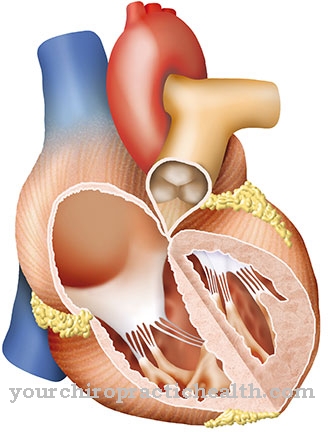A Hepatosis is damage to the liver caused by a build-up of bile. The biliary tract swells and leads to other symptoms such as jaundice. The causes can be varied. Drug treatment often works well.
What is hepatosis?

© Peter Hermes Furian - stock.adobe.com
Doctors understand hepatosis to be an allergic-toxic reaction of the bile that leads to subsequent damage to the liver.
The bile ducts are blocked and the bile syrup builds up. This leads to degenerative changes in the liver tissue. These are accompanied by symptoms such as obesity, jaundice, fever and a general feeling of illness. In many cases, hepatosis is triggered by taking certain medications.
Alternatively, alcohol abuse or permanent malnutrition can also be responsible. If the hepatosis is detected in time, it can be treated well in most cases. If left untreated, however, it can seriously damage the liver and lead to cirrhosis of the liver and, in the worst case, even death.
causes
In most cases, hepatosis is caused by the use of certain medications. Medicines that influence the patient's state of mind are particularly important in this regard.
These include psychotropic drugs, neuroleptics and antidepressants. But some antibiotics can also be the reason for the development of hepatosis, as well as antidiabetic drugs or diuretics. In the past, it was often arsenic compounds that caused hepatosis; this is much less common nowadays.
Estrogens given to women with a hereditary predisposition can cause hepatosis. Last but not least, alcohol abuse or persistent malnutrition can also be responsible for damage to the liver. Metabolic disorders, especially so-called storage diseases, can also promote the development of hepatosis.
Symptoms, ailments & signs
Hepatosis can manifest itself through different symptoms. Bile congestion, which is noticeable through the symptoms of jaundice, is typical of the disease. This can also lead to unusual itching of the skin. Those affected often suffer from obesity and also feel a general feeling of illness.
The malaise is aggravated by a fever. The typical fever symptoms appear in the first stages of the disease and increase in intensity as the disease progresses. Hepatosis can also cause gastrointestinal complaints such as nausea, vomiting, diarrhea, constipation and stomach cramps. The digestive problems usually cause further complaints and relatively quickly lead to fatigue, dizziness and a general decrease in well-being.
Chronic illnesses lead to extreme weight gain. If hepatosis is suspected, a medical examination and treatment is always indicated. Otherwise, it can lead to serious complications. Untreated liver disease initially has a negative impact on the patient's quality of life. The itching spreads over the entire body and also causes redness. The patient's resilience is greatly reduced by hepatosis. In most cases, those affected are no longer able to perform physical activities.
Diagnosis & course
If hepatosis is suspected, a doctor should be consulted. The doctor can make an initial diagnosis based on the symptoms and a detailed discussion, taking into account the medical history and living conditions. This is confirmed with the help of a blood test.
It should be noted, however, that the normal liver values often remain in the normal range in hepatosis. Instead, the levels of alkaline phosphatase, an enzyme, and also the bile pigment bilirubin are significantly increased, which clearly proves the presence of hepatosis.
If the liver damage is left untreated, it can progress further and later lead to liver cirrhosis. This end-stage liver disease gradually restricts the functioning of the liver to the point of complete failure. Cirrhosis of the liver is potentially fatal.
Complications
The hepatosis causes severe damage to the liver. However, the complications and complaints cannot be generally predicted. In most cases, the patient has jaundice. This has an extremely negative effect on the quality of life and on the everyday life of the patient.
Furthermore, there is also a so-called bile congestion and the development of itching all over the body. The skin is reddened as a result and the patient himself also suffers from irritability. It is not uncommon for obesity to occur and with it a relatively strong weight gain. Those affected also have a high fever and generally feel sick and tired.
The patient's resilience also decreases enormously due to the hepatosis and it is no longer possible for the patient to carry out physical activities or sports activities. There are usually no complications in treating hepatosis. This takes place with the help of medication and leads relatively quickly to a positive course of the disease. If the hepatosis was caused by alcohol addiction, withdrawal usually has to be carried out.
When should you go to the doctor?
A doctor should be consulted at the first signs of hepatosis. If you suddenly notice symptoms such as itching, fever or a general feeling of illness, you will have to see a doctor within the next few days. If there are signs of jaundice, a specialist should be consulted immediately.
A high fever or an increasing feeling of illness are also clear warning signs that must be clarified immediately. If the symptoms mentioned increase rapidly in intensity, an immediate clarification by the doctor is indicated. Patients should go to the nearest hospital or the person affected must be brought to the clinic. People receiving medication for another disease are particularly susceptible to hepatosis.
Likewise, people who suffer from a genetic disease and women who regularly take hormones. Alcoholic people and people who have generally unhealthy habits also belong to the risk groups and should consult a doctor quickly if the symptoms mentioned above. Immediate diagnosis and treatment by a specialist is indicated at the latest when complications such as pain in the liver, high fever and cardiovascular complaints are noticed. In addition to the family doctor, a specialist in internal medicine can be called in with hepatosis.
Doctors & therapists in your area
Treatment & Therapy
If hepatosis has been clearly diagnosed after extensive examinations, the attending physician can initiate appropriate therapy. Basically, hepatosis is a disease that is easy to treat and, with appropriate treatment, subsides within a few weeks. If it was triggered by taking medication, the respective medication should be discontinued as soon as possible. If possible, you should avoid taking it again in the future so that hepatosis does not occur again.
Medication containing cortisone may also be given temporarily to help the liver tissue heal. If the hepatosis is caused by alcohol abuse, alcohol therapy is urgently recommended, because regeneration of the liver can only be achieved through permanent abstinence.
A malnutrition that leads to hepatosis should definitely be changed - if necessary under medical supervision - a change in eating habits and lifestyle. In this way, the liver tissue can regenerate and the damage can be prevented from progressing.
Outlook & forecast
From a statistical point of view, hepatosis progresses well in most cases. The fact that the liver stores fats does not immediately lead to serious damage. Specialized doctors can treat a disease very well, especially in the early stages. However, cases related to the consumption of alcohol are not infrequently problematic.
Often people cannot stop their addiction despite treatment and constantly expose the ailing liver to new damage. Liver cells are destroyed. If it continues, organ failure is possible. Then death threatens.
Everyone can do a few things to prevent illness. It is important to eliminate harmful factors, which results in a favorable prognosis even after a previous illness. It has been proven that moderate alcohol consumption helps keep the liver healthy. A balanced diet rich in fiber can also protect the body from the typical symptoms of hepatosis.
Regular physical activity stimulates the recovery of mutated cells. Corresponding activities should be carried out regularly, especially after the first successful treatment. This ensures preventively that the degeneration of the liver cells in the adipose tissue does not recur.
prevention
In some cases, hepatosis can be prevented by adjusting your lifestyle accordingly.The moderate consumption of alcohol and a healthy lifestyle with a balanced diet and sufficient exercise can be helpful in maintaining liver health and ensuring the optimal function of the organ.
If the first signs of hepatosis appear, it is advisable to consult a doctor immediately. Once the diagnosis has been made, he or she can initiate therapy and thus ensure that the disease subsides quickly and without any consequential damage for those affected.
Aftercare
After a successfully treated hepatosis, aftercare plays a minor or no role at all. This is mainly due to the fact that the disease can usually be completely cured. In this case, in view of the freedom of complaints, there are no mandatory appointments. If the changes in the liver cells develop chronically, however, far-reaching other diseases such as hepatitis and liver cirrhosis develop.
These exceed the symptoms of hepatosis and lead to further symptoms that can even be fatal. If follow-up takes place, it is done by the patient. The doctor in charge informed him beforehand about an adjustment to his lifestyle. Alcohol or drug abuse and malnutrition are to be stopped.
In severe cases, it is not easy for the patient to do without the usual search tools. Therapy, which can be ordered several times, helps to combat the actual causes of the hepatosis. The progress of the disease can be monitored by taking blood samples and sonography.
However, these diagnostic procedures are only used if symptoms persist. A healed hepatosis does not lead to immunity. Incorrect lifestyle habits can cause liver disease at any time. Follow-up care then aims to fundamentally change the patient's everyday life.
You can do that yourself
Those affected can often treat hepatosis themselves. If the symptoms are due to an incorrect diet, a change in eating habits should be sought under medical supervision. This and a generally healthy lifestyle with sufficient exercise and the avoidance of stress can regenerate the liver tissue and prevent the progression of hepatosis.
If the liver damage is the result of an alcohol problem, alcohol consumption must be stopped. Therapy is also advisable. Long-term liver regeneration can only be achieved through permanent abstinence. In addition, the doctor will prescribe various drugs such as prednisone, which should cause the liver to swell quickly.
Depending on how severe the hepatosis is, various remedies from homeopathy are also available for supportive treatment. Which preparations are suitable should be discussed with the responsible doctor. If a drug is the cause, it must be discontinued as soon as possible. Subsequently, the progression of hepatosis can be counteracted by conservative treatment methods and a healthy lifestyle.
In severe cases, undetected hepatosis can lead to circulatory collapse and ultimately death. First aiders should inform the emergency doctor immediately and calm the person down and, if necessary, reanimate them.


.jpg)









.jpg)



.jpg)










.jpg)
